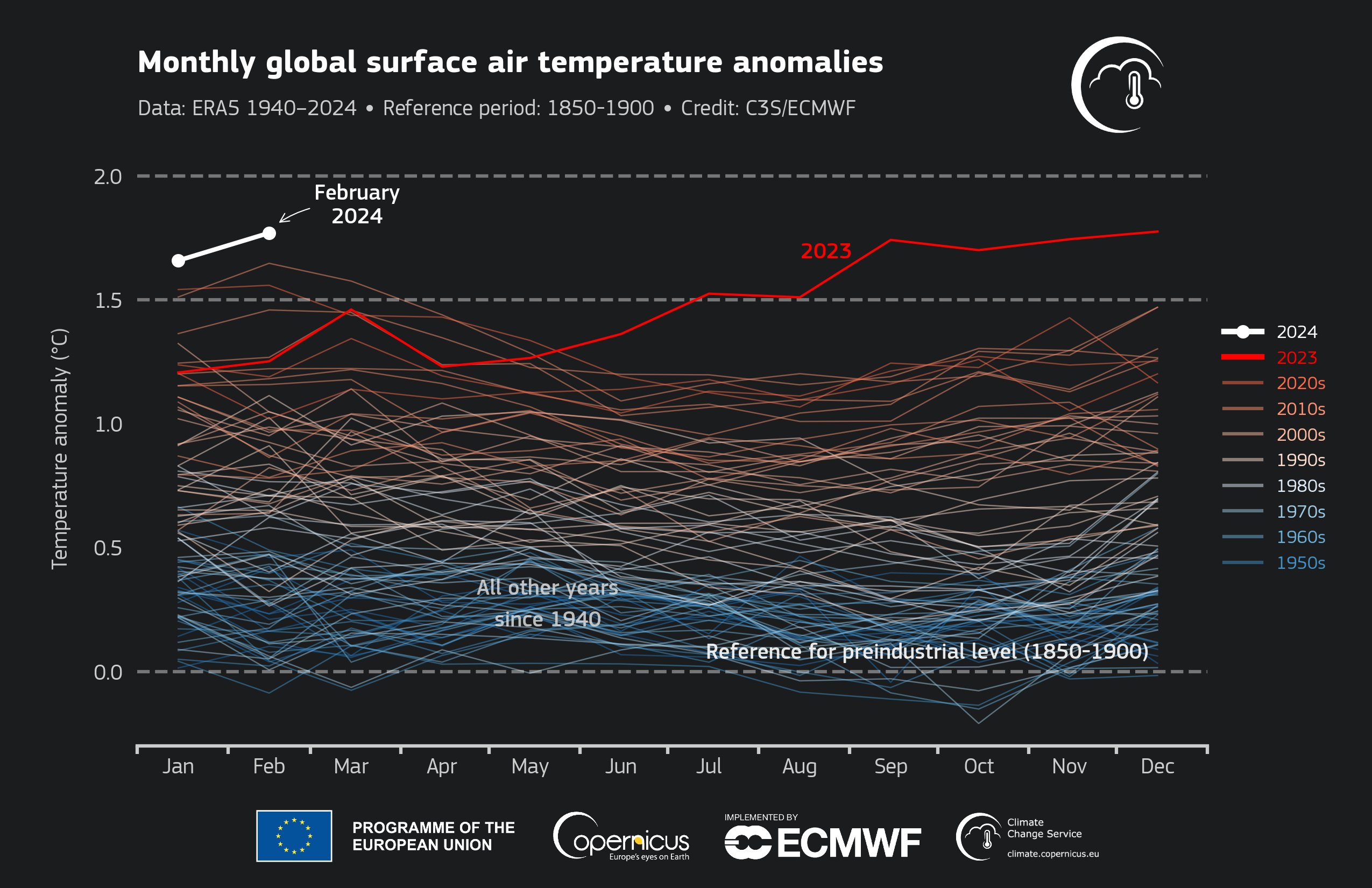Pictured is a graph of historical global sea-surface temperatures across the year from 1982-2024. Yesterday was about 0.3°C warmer than last year. Well, maybe it will go back down since this is an El Niño year? :>
Average global surface air temperature in February 2024 was 1.77°C warmer than the average February from 1850-1900. So maybe we can retire those 1.5°C warming goals now?

However, the IPCC reports that global temperatures have only risen by 1.1°C. This is because they use decade-long averages. Indeed, it is completely possible that 2025 will be cooler than 2024, but crop failures don't care much for averages. ![]() And if global warming has accelerated, the IPCC's method will be a decade late to realizing it. Not that they can actually do anything about it...
And if global warming has accelerated, the IPCC's method will be a decade late to realizing it. Not that they can actually do anything about it...


obviously this is warmer than usual, but i still have an unrelated stupid question: why isn't ocean temperature basically constant over a year? are they measuring a certain area more than others? seasons shouldn't affect this, so is the orbit doing something weird?
The eccentricity of Earth's orbit is pretty inconsequential. It's something like a 3% difference between the furthest and closest points, the changes in tilt relative to the sun or the kind of surface exposed to the sun make basically all of the difference.
The sun only heats the top layers of the ocean, like a couple hundred feet iirc, and unevenly at that. It would take a very very long time for all the water in the ocean to reach a true equilibrium (if the sun turned off tomorrow) but it doesn't get to because of the day/night cycle, the seasons, wind and the Earth's actual rotation etc. So that produces recurring ocean currents, which are chaotic in nature, thus leading to the ocean temperature to vary (drastically at times).
This newest warming though I think is largely an unintended consequence of the new bunker fuel regulations in 2020 that drastically reduced the amount of Sulfur in it. The sulfur dioxide produced from all those container ships actually has a cooling effect so really the planet was 'already' this warm, we were just countering it somewhat. It also is what is mainly responsible for acid rain so we can't just pump a bunch of it into the atmosphere.
so by enacting certain long-term climate policies, it actually gets warmer short-term? man-made horrors now within my comprehension
Oh yeah that's the fun of dealing with a hypercomplex system. It should help with rewilding efforts but those won't show results for awhile, assuming they're followed through on.
To temper the bleakness a bit, it also means that with the right interventions it would be possible to have similarly drastic positive results.
To add to this we don't really go "around" the sun, if my understanding is correct. We're essentially chasing it as it shoots through space dragging us all in its wake.
"going around" is a fine enough description. It is true though that the solar system as a whole is orbiting around the galactic core.
If you look at the scale, the seasonal variations are actually quite small. The ocean temperature was quite stable in a narrow band from 20-20.5C. Was. Water has a high heat capacity and the top few feet of the oceans is a colossal amount of water. I saw last year's rise described as "adding 500 million Hiroshima bombs of heat to the ocean." (Just normal variations I am sure, lol)
Just a guess, but the earth orbits closer to the sun during the northern hemisphere’s summer and farther during the northern hemisphere’s winter.
There's also not the same amount of ocean surface on the northern hemisphere and southern hemisphere, although I think this actually cancels out some of the difference due to Earth's orbit.
deleted by creator
Yeah, the other comment explained the actual reason, which is ocean currents. I was just spitballing but both the reasons in this particular thread of responses are extremely small next to ocean currents.